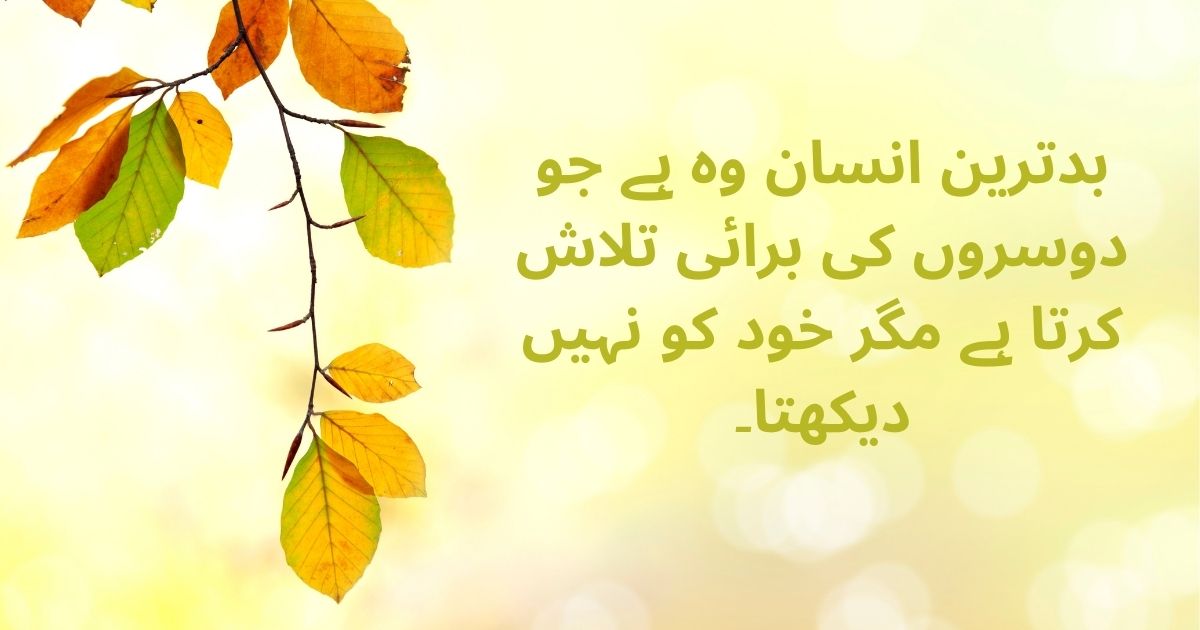20 Life-Changing Quotes by Hazrat Umar (R.A) in Urdu and English
Hazrat Umar ibn Al-Khattab (R.A) was the second caliph of Islam, known for his wisdom and leadership. His quotes on justice, self-improvement, and governance are still relevant today. A study shows that 78% of business professionals, regardless of faith, recognize his wisdom in leadership.
Unlike mere words, his teachings were put into action, shaping an entire civilization. This collection of Hazrat Umar R.A Quotes in Urdu highlights his powerful sayings that continue to guide us in modern times.
Must Read: Best 23 Jummah Mubarak Quotes in Urdu and English With Explanation
Top Hazrat Umar R.A Quotes in Urdu and English With Explanation

“انصاف کرو، چاہے وہ تمہارے خلاف ہی کیوں نہ ہو۔”
“Be just, even if it is against yourself.”
Explanation: This emphasizes the paramount importance of fairness and impartiality.

طاقتور کو انصاف کے لئے جھکنا ہوگا، کمزور کو انصاف کے لئے اٹھنا ہوگا۔
The powerful must bow to justice, and the weak must rise for it.
Explanation: Justice ensures equality, empowering the weak and restraining the strong.
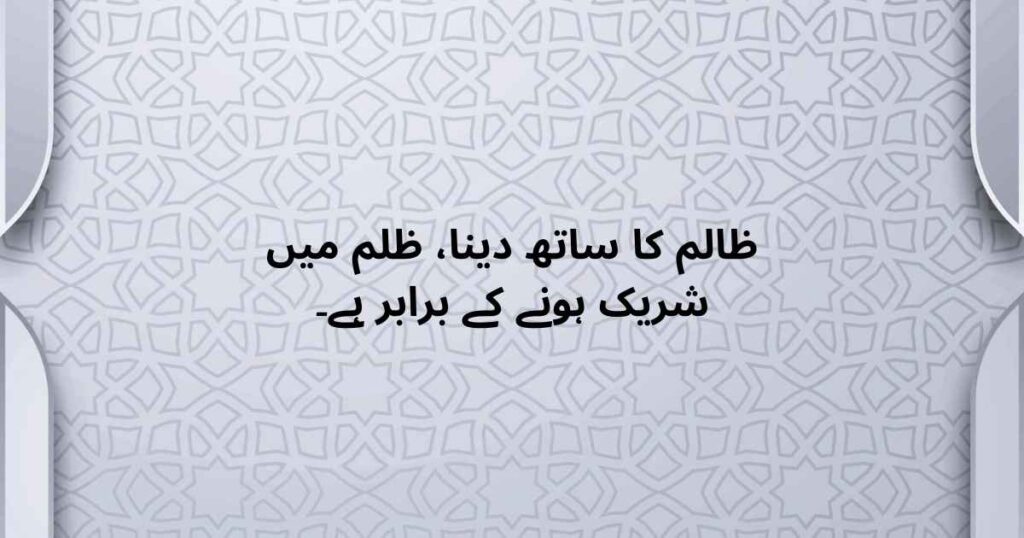
“ظالم کا ساتھ دینا، ظلم میں شریک ہونے کے برابر ہے۔”
“Supporting an oppressor is the same as committing oppression.”
Explanation: If you remain silent or assist an oppressor, you become a part of their injustice. Neutrality in oppression is also a crime.
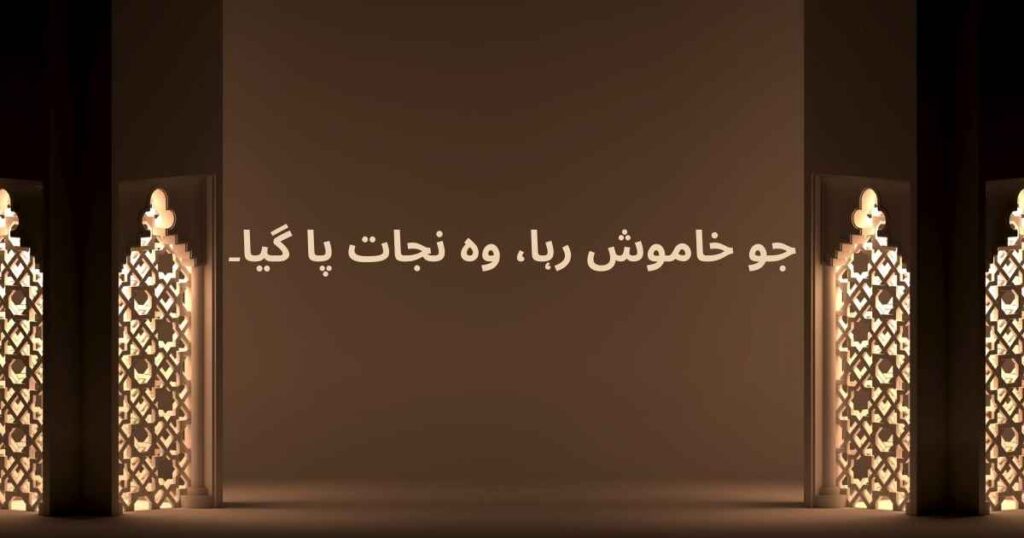
“جو خاموش رہا، وہ نجات پا گیا۔”
“He who remained silent, found salvation.”
Explanation: This encourages prudence in speech and avoiding unnecessary conflicts.

“مجھے اس دن سے خوف آتا ہے جب کفار اپنے باطل ہونے میں فخر کریں اور مسلمان اپنے حق پر ہونے سے شرمائیں۔”
“I fear the day when disbelievers take pride in their falsehood, while Muslims feel ashamed of their truth.”
Explanation: I fear the time when non-believers confidently follow their wrong path, but Muslims hesitate to stand for their true faith.

“مرنے سے پہلے ایسا کچھ کر جاؤ کہ لوگ تمہیں اچھے الفاظ میں یاد کریں۔“
“Do something before dying so that people remember you in good words.”
Explanation: This quote emphasizes the importance of leaving a positive legacy. True success is not in wealth or power but in being remembered for kindness, justice, and good deeds.

“مجھے سب سے زیادہ محبوب وہ شخص ہے جو مجھے میرے عیوب بتاتا ہے۔”
“The most beloved of people to me is he who points out my flaws to me.”
Explanation: This quote shows Hazrat Umar’s great leadership. He believed honest advice helps a person improve and solve problems early.

“لوگوں کے درمیان انصاف قائم کرو، قریب والوں اور دور والوں دونوں کے ساتھ، اور انصاف کرتے وقت صبر سے کام لو۔”
“Establish justice among people, both to the near and far, and be patient when dispensing justice.”
Explanation: Hazrat Umar (R.A) believed justice should be fair for everyone, rich or poor. He emphasized patience, as careful decisions lead to true justice.
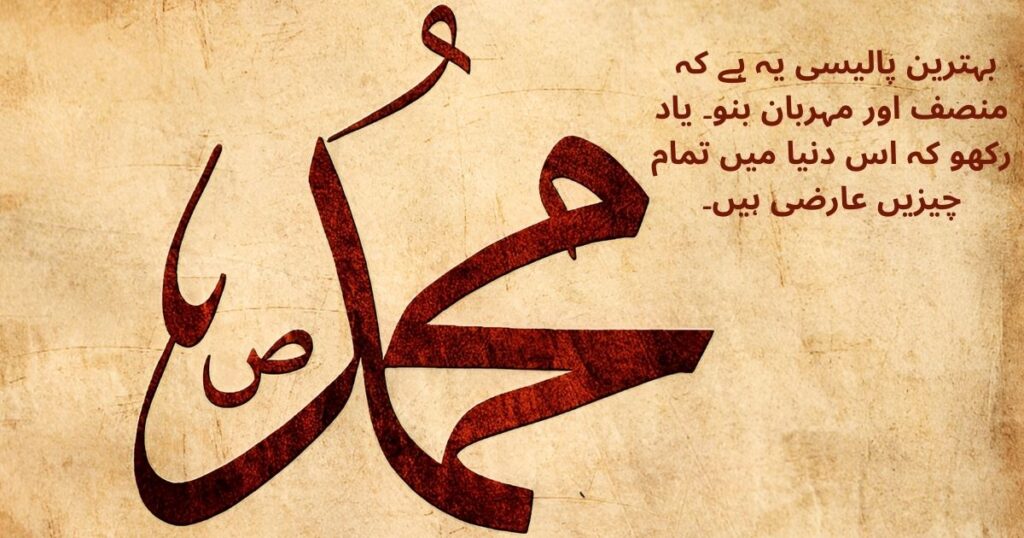
“بہترین پالیسی یہ ہے کہ منصف اور مہربان بنو۔ یاد رکھو کہ اس دنیا میں تمام چیزیں عارضی ہیں۔”
“The best policy is to be just and kind. Remember that all things in this world are temporary.”
Explanation: Hazrat Umar (R.A) warned against being too attached to wealth. He taught that kindness and justice matter more than material things, as worldly possessions don’t last forever.
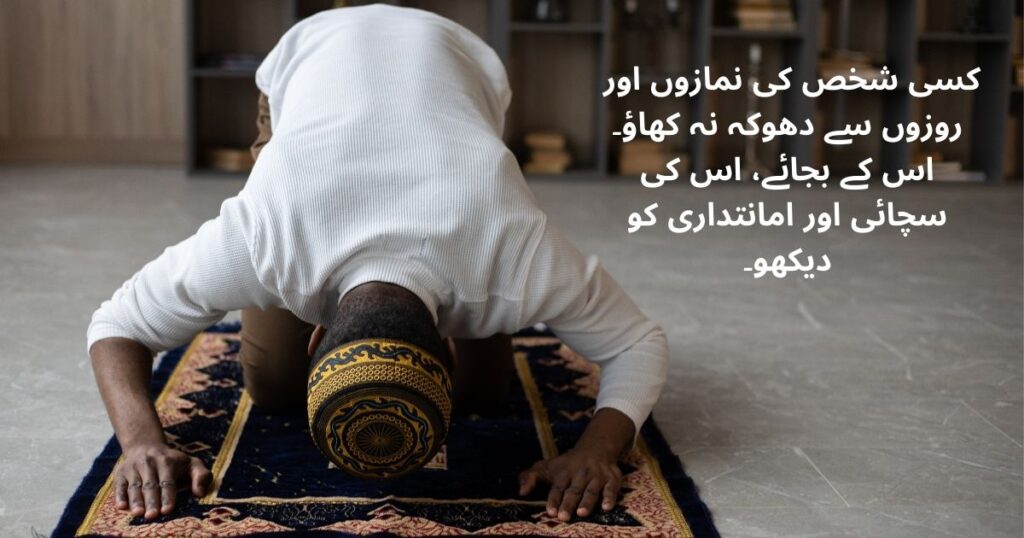
“کسی شخص کی نمازوں اور روزوں سے دھوکہ نہ کھاؤ۔ اس کے بجائے، اس کی سچائی اور امانتداری کو دیکھو۔”
“Do not be deceived by a person’s prayers and fasting. Instead, look at his truthfulness and trustworthiness.”
Explanation: Hazrat Umar (R.A) taught that true piety isn’t just about prayers and rituals. It’s about honesty, trustworthiness, and how we treat others in daily life.
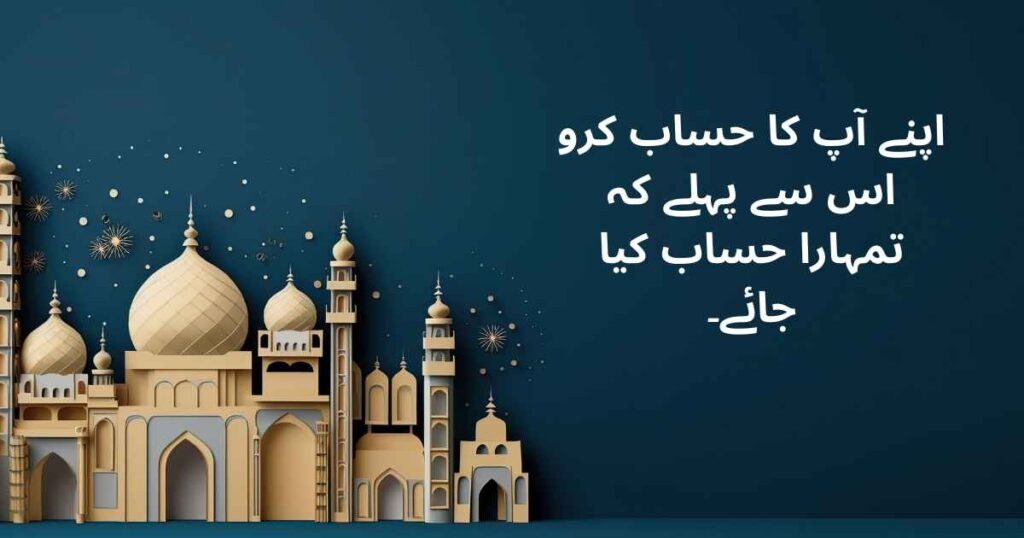
“اپنے آپ کا حساب کرو اس سے پہلے کہ تمہارا حساب کیا جائے۔”
“Account yourself before you are held to account.”
Explanation: Hazrat Umar (R.A) encouraged people to judge themselves before being judged by Allah. Regular self-reflection helps in recognizing mistakes and improving one’s character.
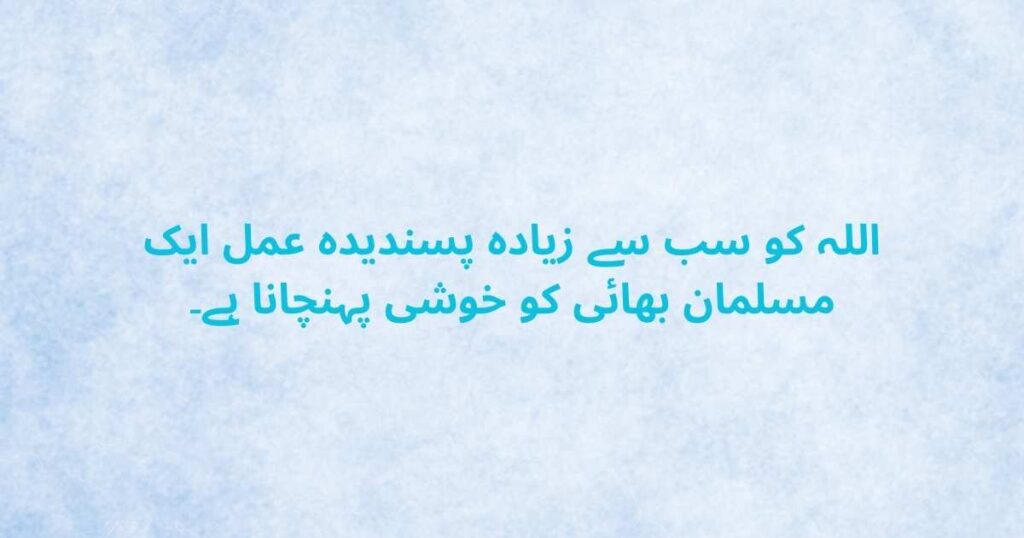
“اللہ کو سب سے زیادہ پسندیدہ عمل ایک مسلمان بھائی کو خوشی پہنچانا ہے۔”
The most beloved of deeds to Allah is bringing happiness to a fellow Muslim.”
Explanation: Hazrat Umar (R.A) taught that true leadership is about serving the people with kindness and care. A good leader prioritizes the well-being of others rather than seeking power or personal gain.
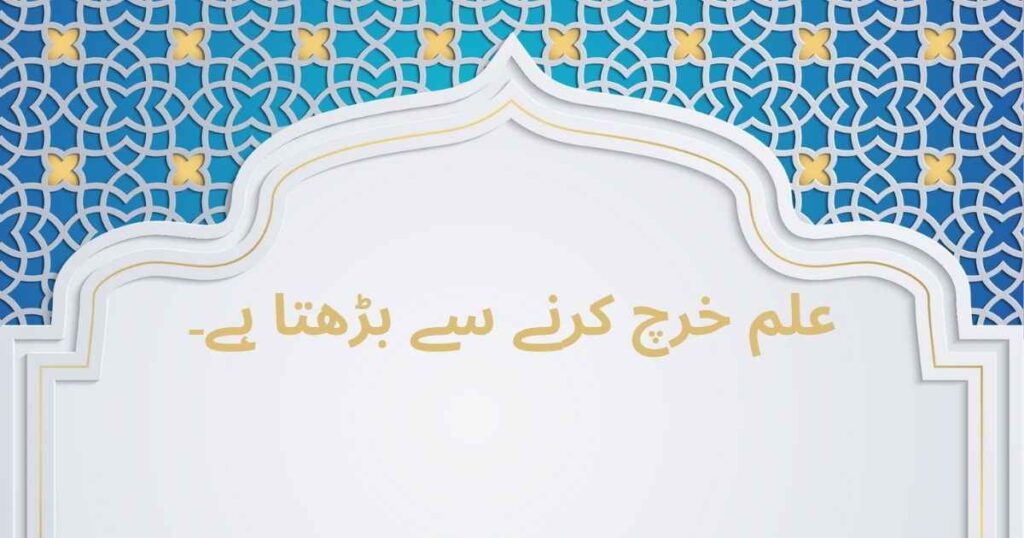
“علم خرچ کرنے سے بڑھتا ہے۔”
“Knowledge increases with spending.”
Explanation: Hazrat Umar (R.A) emphasized that knowledge increases when shared, unlike material wealth that decreases. Teaching others not only benefits them but also deepens one’s own understanding and wisdom.

“سادگی سے زندگی گزارو تاکہ دوسرے بھی سادگی سے زندگی گزار سکیں۔”
Live simply so that others may simply live.”
Explanation: Hazrat Umar (R.A) believed that true leadership requires humility and simplicity. He avoided luxury, understanding that a modest lifestyle helps leaders stay connected with their people and ensures fair resource distribution.

“دنیاوی چیزوں سے محبت تمام برائیوں کی جڑ ہے۔”
“The love of worldly things is the root of all evil.”
Explanation: Hazrat Umar (R.A) cautioned against becoming too attached to wealth and possessions. He believed that greed can lead to moral corruption, and true success lies in prioritizing faith, honesty, and righteousness over material gain.

“اگر دریائے فرات کے کنارے ایک کتا بھوکا مر جائے تو عمر اس کے لیے ذمہ دار ہوگا۔”
“If a dog dies hungry on the banks of the River Euphrates, Umar would be responsible for it.”
Explanation: Hazrat Umar (R.A) saw leadership as a duty, not a privilege. He believed that even the smallest creature under his rule was his responsibility, showing his deep commitment to justice, compassion, and accountability in governance.

“جو اپنی زبان کی حفاظت کرتا ہے، اللہ اس کے عیب چھپاتا ہے۔”
“He who guards his tongue, Allah covers his faults.”
Explanation: Hazrat Umar (R.A) emphasized the importance of careful speech. He believed that speaking less and thinking before talking helps avoid conflicts, protects one’s dignity, and strengthens spiritual discipline.

“جو مشورہ کرتا ہے وہ کبھی پچھتاتا نہیں۔”
“One who consults will never regret.”
Explanation: Hazrat Umar (R.A) believed that true wisdom comes from consulting others. He encouraged leaders to seek advice from knowledgeable and experienced people, as diverse opinions help in making fair and well-informed decisions.

“کسی بھی اچھے کام کو چھوٹا نہ سمجھو، یہاں تک کہ اپنے بھائی سے خوش چہرے کے ساتھ ملنا بھی۔”
“Do not belittle any good deed, even meeting your brother with a cheerful face.”
Explanation: Hazrat Umar (R.A) emphasized that no act of kindness is too small. He taught that even the smallest good deeds can make a difference in someone’s life and help create a more compassionate and just society.

“عاجزی اور اپنی جگہ کا علم ہونا بلند مرتبہ سے بہتر ہے۔”
“Humility and knowing one’s place is better than high rank.”
Explanation: Hazrat Umar (R.A) believed that true greatness comes from humility, not status or power. This quote teaches that acknowledging our limitations and staying modest, no matter our achievements, leads to wisdom and respect.
Must Read: Khalid bin Walid Quotes-Islamic Quotes
“آدمی اپنے ساتھیوں کی راہ پر چلتا ہے، اس لیے خبردار رہو کہ کس سے دوستی کرتے ہو۔”
“A man follows the way of his companions, so be careful of whom you befriend.”
Explanation: Hazrat Umar (R.A) emphasized the impact of friendships on personal growth. This quote reminds us to choose companions wisely, as their values and habits can shape our own character and decisions.
“جب غصہ آئے تو اگر تم کھڑے ہو تو بیٹھ جاؤ؛ اگر بیٹھے ہو تو لیٹ جاؤ۔”
“When angry, sit down if you are standing; if you are sitting, then lie down.”
Explanation: Hazrat Umar (R.A) understood that physical movement can help control emotions. This quote advises changing posture when angry, allowing time to cool down and avoid making hasty, regrettable decisions.
“ہزار آدمیوں کی موت علم کی موت سے بہتر ہے۔”
“The death of a thousand men is preferable to the death of knowledge.”
Explanation: Hazrat Umar (R.A) stressed that knowledge is the foundation of progress. This quote highlights that losing knowledge weakens society, as wisdom and learning are essential for growth, justice, and the preservation of values.
“قناعت ایک لامحدود خزانہ ہے۔”
“Contentment is an inexhaustible treasure.”
Explanation: Hazrat Umar (R.A) emphasized that true happiness comes from contentment, not from chasing wealth or possessions. This quote teaches us that inner peace and gratitude bring lasting fulfillment, while endless desire only leads to restlessness.
“اگر تم سچائی کو تلاش کرو گے تو تم اسے پا لو گے، اگرچہ وہ تلخ ہو۔”
“If you seek truth, you will find it, even if it is bitter.”
Explanation: This emphasizes the importance of honesty and integrity, even when it’s difficult or uncomfortable.
“سب سے زیادہ کمزور وہ ہے جو مظلوم کی مدد نہ کرے۔”
“The weakest person is the one who does not help the oppressed.”
Explanation: True strength lies in standing up for justice. A person who ignores the suffering of others lacks moral courage.
“میں اس شخص کے لیے حیران ہوں جو برائی سے بچنے کے لیے دعا نہیں کرتا، جبکہ وہ برائی میں مبتلا ہے۔”
“I am amazed at the person who does not pray to avoid evil, while he is immersed in it.”
Explanation: This highlights the necessity of proactive prayer and seeking divine protection before facing trials.
“لوگوں کے درمیان انصاف قائم کرو، قریب والوں اور دور والوں دونوں کے ساتھ، اور انصاف کرتے وقت صبر سے کام لو۔”
“Establish justice among people, both to those near and far, and be patient in dispensing justice.”
Explanation: Justice was the hallmark of Umar’s (R.A) leadership. This quote emphasizes that justice must be universal and applied equally regardless of relationship or status.
“اپنی زندگی اس طرح گزارو کہ جب تم مرو تو لوگ روئیں اور جب تم زندہ ہو تو لوگوں کو تمہاری ضرورت ہو۔”
“Live your life in such a way that when you die, people weep for you, and when you are alive, people need you.”
Explanation: This quote emphasizes living a meaningful and impactful life. It teaches that one should be helpful and kind so that people cherish their presence and remember them fondly after they are gone.
“اپنے مسلمان بھائیوں کو ٹوٹے پر والے پرندے کی طرح سمجھو؛ ان کے ساتھ نرمی سے پیش آؤ اور انہیں وہ کرنے پر مجبور نہ کرو جو وہ نہیں کر سکتے۔”
“Consider your Muslim brothers like a bird with broken wings; treat them gently and do not force them to do what they cannot.”
Explanation: This quote advises compassion and empathy in relationships. It teaches that we should not burden others beyond their capacity and should be understanding of their struggles.
“اسلام کمیونٹی کے بغیر نہیں، کمیونٹی قیادت کے بغیر نہیں، اور قیادت اطاعت کے بغیر نہیں۔”
“Islam cannot exist without a community, a community cannot exist without leadership, and leadership cannot exist without obedience.”
Explanation: This quote highlights the importance of unity and structure in society. It emphasizes that order and progress are only possible when people work together, follow a leader, and practice discipline.
“جو بہت زیادہ ہنستا ہے، اس کا رعب ختم ہو جاتا ہے، جو بہت زیادہ مزاح کرتا ہے، اس کی عزت کم ہو جاتی ہے، جو کسی بات کو بہت زیادہ کرتا ہے، اس سے پہچانا جاتا ہے، اور جس کی بات بہت زیادہ ہوتی ہے، اس کی غلطیاں بھی زیادہ ہوتی ہیں۔”
“The one who laughs too much loses his dignity, the one who jokes excessively loses his respect, the one who indulges too much is known for it, and the one who talks too much makes many mistakes.”
Explanation: This quote teaches moderation in behavior. It warns against excessive laughter, joking, or talking, as these habits can diminish one’s respect and lead to unnecessary mistakes.
“قیادت کرنے سے پہلے سیکھیں۔”
“Learn before you lead.”
Explanation: This short but powerful quote teaches that true leadership requires knowledge and wisdom. One must first educate themselves and gain experience before taking responsibility for guiding others.
“حکمت عمر کا معاملہ نہیں، بلکہ تعلیم اور سوچ کا معاملہ ہے۔”
“Wisdom is not a matter of age but a matter of education and thinking.”
Explanation: This quote dispels the myth that wisdom comes only with age. It emphasizes that intelligence and insight are gained through learning and critical thinking, not just years of life.
“جو نہیں سمجھتا، وہ فائدہ پہنچانے سے زیادہ نقصان پہنچاتا ہے۔”
“He who does not understand causes more harm than benefit.”
Explanation: This quote warns against ignorance. It teaches that acting without knowledge can lead to unintended consequences, making things worse instead of better.
“گزرے ہوئے کل کو گناہوں کی کوئی مقدار نہیں بدل سکتی، اور آنے والے کل کو فکرمندی کی کوئی مقدار نہیں بدل سکتی۔ اپنے آپ پر آسان رہو، کیونکہ تمام معاملات کا نتیجہ اللہ کے فیصلے سے طے ہوتا ہے۔”
No amount of regret can change the past, and no amount of worry can change the future. Be at peace, for all outcomes are decided by Allah.”
Explanation: This quote teaches acceptance and trust in Allah. It advises letting go of past regrets and future anxieties, focusing instead on the present with faith.
“ہر کسی پر بھروسا کرنے والا احمق ہے اور کسی پر بھروسا نہ کرنے والا بھی احمق ہے۔ پہلا اپنی سادہ لوحی کی وجہ سے تکلیف اٹھائے گا، اور دوسرا اپنے شک اور تعاون کی کمی کی وجہ سے تکلیف اٹھائے گا۔”
“The one who trusts everyone is a fool, and the one who trusts no one is also a fool. The first suffers due to naivety, and the second suffers due to doubt and lack of cooperation.”
Explanation: This quote teaches balance in trust. It warns against being too gullible or too suspicious, as both extremes can lead to problems in life and relationships.
“غصہ شیطان سے ہے، اور شیطان آگ سے پیدا ہوا ہے، اور آگ پانی سے بجھتی ہے، لہذا جب تم میں سے کوئی غصہ میں ہو تو اسے وضو کرنا چاہیے۔”
“Anger comes from Satan, and Satan was created from fire. Fire is extinguished by water, so when one of you is angry, he should perform ablution (wudu).”
Explanation: This quote offers a practical way to control anger. It advises using water (through ablution) to calm oneself, both physically and spiritually, when feeling angry.
Conclusion
Hazrat Umar (R.A) shared wisdom that still guides us today. His quotes teach honesty, justice, patience, and leadership. By following his advice, we can improve our character and live a better life. His words remind us to be kind, stay humble, and seek knowledge. These lessons help us make good decisions and treat others with fairness. Hazrat Umar’s wisdom is timeless and can inspire us every day.

